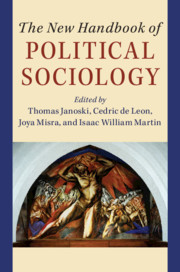Book contents
- The New Handbook of Political Sociology
- The New Handbook of Political Sociology
- Copyright page
- Dedication
- Contents
- Tables
- Figures
- Contributors
- Acknowledgments
- Introduction
- I Theories of Political Sociology
- II Media Explosion, Knowledge as Power, and Demographic Reversals
- III The State and Its Political Organizations
- IV Civil Society: The Roots and Processes of Political Action
- V Established and New State Policies and Innovations
- VI Globalization and New and Bigger Sources of Power and Resistance
- 36 Global Political Sociology and World-Systems
- 37 Liberalizing Trade and Finance
- 38 The Racial State in the Age of Racial Formation Theory and Beyond
- 39 Democracy and Autocracy in the Age of Populism
- 40 Transnational Social Movements
- Index
- References
39 - Democracy and Autocracy in the Age of Populism
from VI - Globalization and New and Bigger Sources of Power and Resistance
Published online by Cambridge University Press: 22 February 2020
- The New Handbook of Political Sociology
- The New Handbook of Political Sociology
- Copyright page
- Dedication
- Contents
- Tables
- Figures
- Contributors
- Acknowledgments
- Introduction
- I Theories of Political Sociology
- II Media Explosion, Knowledge as Power, and Demographic Reversals
- III The State and Its Political Organizations
- IV Civil Society: The Roots and Processes of Political Action
- V Established and New State Policies and Innovations
- VI Globalization and New and Bigger Sources of Power and Resistance
- 36 Global Political Sociology and World-Systems
- 37 Liberalizing Trade and Finance
- 38 The Racial State in the Age of Racial Formation Theory and Beyond
- 39 Democracy and Autocracy in the Age of Populism
- 40 Transnational Social Movements
- Index
- References
Summary
The twenty-first century might be known as the populist century. No longer confined to Latin America or to the margins of European and American politics, populism spread to Africa, Asia, the Middle East, and, with Donald Trump’s election, to the cradle of liberal democracy. Washington – and not Peronist Buenos Aires or Hugo Chávez’s Caracas – is the new international center of populism. Geert Wilders hailed Trump’s election as a “revolution,” while Marine Le Pen talked about the “emergence of a new world.” It remains to be seen whether Trump’s election will spark a wave of radical right-wing populists to power, or on the contrary that his autocratic manners and policies will lead voters in other parts of the world to turn away from populist mavericks.
- Type
- Chapter
- Information
- The New Handbook of Political Sociology , pp. 1027 - 1052Publisher: Cambridge University PressPrint publication year: 2020



